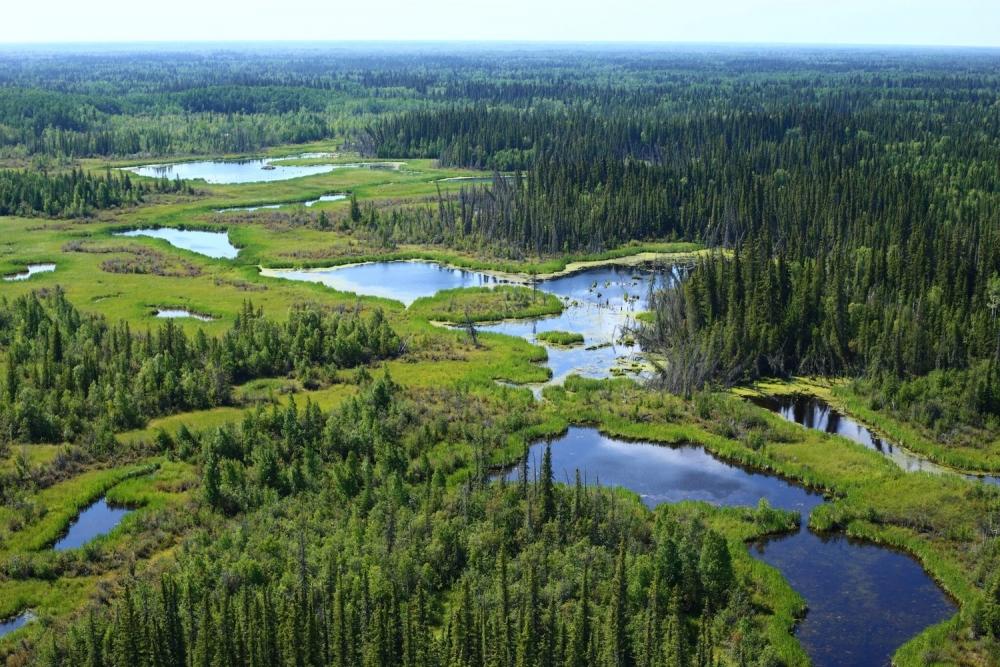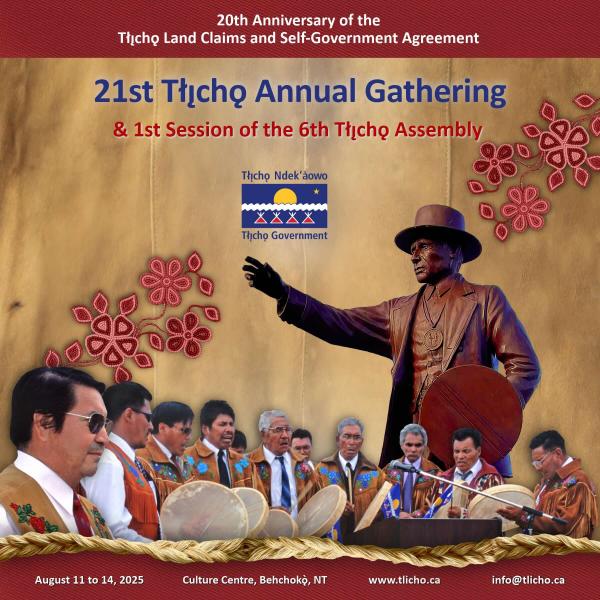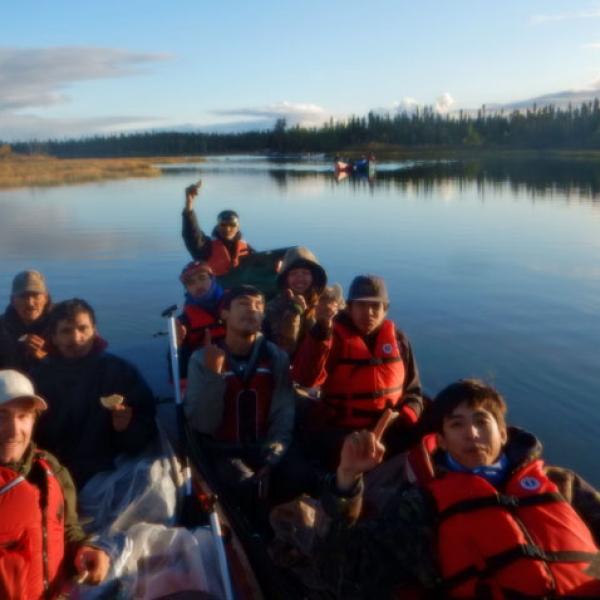Major Milestone Reached in Indigenous-Led Initiative to Sustain Lands and Support Community Economic Development Across the NWT
Yellowknife: October 13, 2023 In a collaboration unprecedented in scale and breadth, representatives from Indigenous Governments, the Government of Canada, the Government of the Northwest Territories, and private philanthropies announced a visionary framework agreement today. The agreement outlines the terms and expected outcomes of a major new initiative that will fund the protection of lands, support thriving cultures, and foster economic diversification across the Northwest Territories.
Reaching this milestone involved a groundbreaking effort to bring together many diverse partners around a shared vision and a commitment to an ongoing process of cooperation. Once finalized, the project will become one of the largest Indigenous-led land conservation initiatives in the world.
It will also help nature and communities become more resilient in the face of climate change. The devastating wildfires in the Northwest Territories this summer underscore the need for effective solutions for an unpredictable future. This initiative, known as the Northwest Territories Project Finance for Permanence, or NWT PFP, could help communities conduct climate monitoring and prepare for increased fire risk, changing water levels, and other climate impacts.
Centering the agreement on Indigenous leadership will generate sweeping benefits, including community wellbeing and capacity building, guardianship, reconciliation, and cultural revitalization.
This made-in-the-north initiative will also support healthy and equitable economies that balance growth and prosperity with climate, food security, and conservation-based activities. It will create new jobs and draw new investments in community economic development opportunities across the region.
The project will help advance the GNWT conservation work plan, Healthy Land, Healthy People (2023-2028), and contribute significantly to Canada’s goals of conserving 25 per cent of lands and waters by 2025 and 30 per cent by 2030. Preliminary estimates show that when the project is fully funded and implemented, it could contribute roughly 2.5 per cent over time towards Canada’s conservation targets, from existing, enhanced, and new protected and conserved areas.
The framework agreement outlines activities that would be within the scope of investments, including support for establishing new protected and conserved areas identified by Indigenous Governments, as well as ongoing stewardship of existing areas. Critical needs like climate research and investments in conservation-based economic opportunities could be funded, along with Guardians programs and on-the-land, cultural, and Indigenous language programs.
Environment and Climate Change Canada has made an initial floor commitment of $100 million, with final contributions to be reflected in the closing agreement. Private donors including Canadian philanthropies are working to raise up to $100 million with the expectation it will become the basis of a 1 to 4 match in contributions from the federal government.
The initiative is designed around the financing model known as Project Finance for Permanence. PFPs lead to comprehensive funding agreements between partners including governments at all levels and private philanthropies that are designed to sustain healthy lands and local economies. Within the Northwest Territories, this means building on a strong foundation of existing collaboration among Indigenous and public governments.
In the coming months, partners will work towards a final agreement to confirm the scale of activities and the resource commitments required to deliver the initiative’s full vision of conservation, stewardship, and economic development benefits.
Representatives of the initiative’s partners shared the following quotes:
The Honourable Steven Guilbeault, Minister of Environment and Climate Change Canada
“Canada’s ambitious conservation goals can only be met in partnership with Indigenous Peoples. This agreement is a testament to what can be achieved when we work together to realize a shared goal. By coupling Indigenous and Western science, we can fight the twin crises of climate change and biodiversity loss, strengthen our relationships with Indigenous communities, and build a better future for everyone.”
Minister Shane Thompson, Environment and Climate Change, Government of the Northwest Territories
“I am very excited by this historic project and the unprecedented partnership—convened by the Indigenous Leadership Initiative—with Environment and Climate Change Canada, Pew Charitable Trusts and numerous NWT Indigenous Governments. Their participation reflects a commitment to a healthy environment and economy in the NWT, balancing conservation, climate, health, and culture with economic opportunities.”
Grand Chief Jackson Lafferty, Tłı̨chǫ Government
“We have felt the devastating effects of climate change firsthand. We’ve seen homes and cabins lost or damaged, lives disrupted by evacuation and habitat destroyed. These climate impacts demonstrate the importance of our work together. Once final, the NWT PFP will strengthen the ability of Indigenous Governments to steward lands in ways that protect our well-being and way of life, make communities more resilient, and address climate change and loss of biodiversity.”
Grand Chief Herb Norwegian, Dehcho First Nations
"Our lands and waters throughout the entire Dehcho watershed and Denedeh need to be fully protected by using traditional knowledge and Western science to create ecological havens for all life and future generations to flourish. This framework agreement is a milestone towards important resources to achieve this vision.”
Grand Chief Ken Kyikavichik, Gwich'in Tribal Council
“The Gwich’in are caretakers of the Gwich’in Settlement Region. Safeguarding our land, water and resources as outlined in the NWT PFP: Land, Life, Future initiative aligns with our Gwich’in Values and stewardship responsibilities. Working together with so many partners to develop this milestone framework agreement provides us with optimism for our future generations. These partnerships will help lay the groundwork for a successful final agreement, which will assist us in creating a regional Guardian program in the Gwich’in Settlement Region.”
Ɂek’wahtı̨dǝ́ Danny Gaudet, Délįnę Got’įnę Government
“This is an important milestone, and we are ready to work toward a final agreement. One of the most important impacts of the initiative include support for Indigenous languages, cultures, and ways of life. All of this is rooted in the land, and all of it supports stewardship of the land. That's why the NWT PFP will not only expand conservation, but it will also advance reconciliation by respecting Indigenous knowledge and decision-making.”
President Garry Bailey, Northwest Territory Métis Nation
"The fires have taken a big toll on our communities and our Indigenous way of life. We are looking forward to working together to create a more resilient future through collaboration and cooperation. The PFP initiative has brought a record number of partners together around to support a vision for Indigenous-led stewardship of lands and waters in the NWT. This initiative will build capacity in our communities and enable Indigenous leadership for stewardship. We will use and share our Indigenous knowledge to help provide land-based solutions to climate change and loss of habitat.”
President Marc Whitford, North Slave Métis Alliance
“The North Slave Métis are proud to be a part of the Project Finance for Permanence process and working alongside our fellow Indigenous Governments and Organizations from across the Northwest Territories. With the ongoing and uncertain effects of changing environmental conditions, it is imperative that we work together as a united front. We must continue to protect and advocate for ourselves, our rights, our wildlife and our land into the future. The long-term reliable funding provided through the PFP process will be instrumental to our organization to not only address but meet our community’s conservation needs and priorities. We are looking forward to continuing this collaboration with our Indigenous neighbors, government partners, and industry representatives.”
Tom Dillon, Senior Vice President for Environment and Crosscutting Initiatives at The Pew Charitable Trusts:
“Today’s announcement represents another milestone in the decades-long effort by Indigenous Governments in the Northwest Territories to advance conservation and prosperity on traditional lands and waters for future generations. In addition to sustaining nature and people across the territory, the NWT PFP promises climate and biodiversity benefits for all of Canada and the world. The Pew Charitable Trusts is honored to collaborate with all partners to support this inspirational initiative.”






